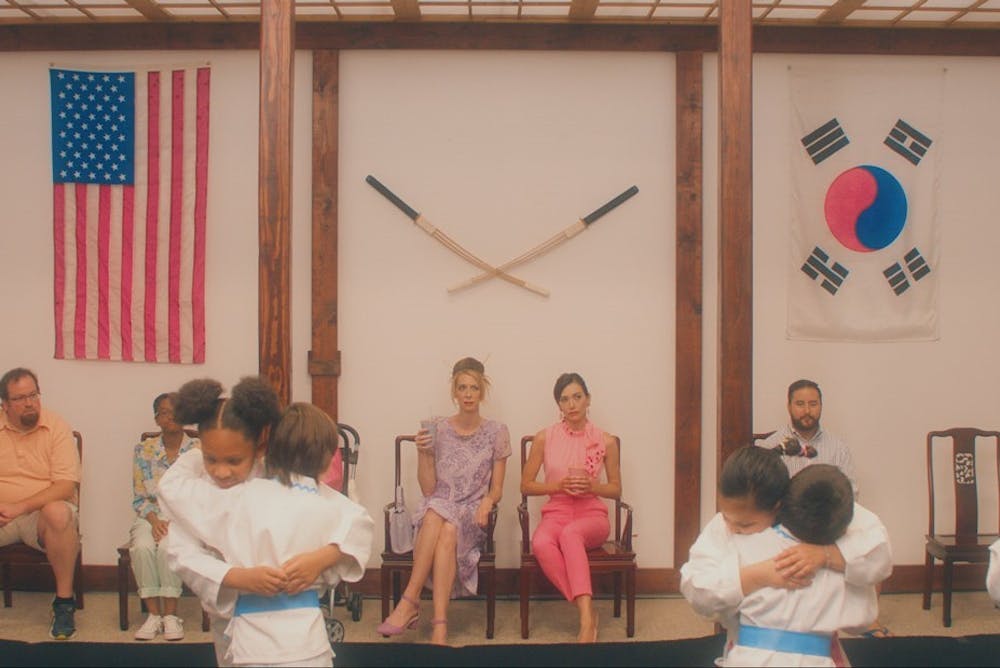Greener Grass, just recently released on Hulu, opens to classical music playing on a field nestled within the heart of Suburbia. The setting is familiar. We've all seen the trope of perfectly WASP–y, pristine, entirely constructed environments filled with entirely fake people. Here, a melodramatic spectacle is made of a children’s soccer game. A child yawns, a boy bumps into him, and then he collapses onto the ground, hyperventilating and crying for his mother.
The theatricality of the soccer field filled with PTA moms is just the beginning of the hysterics. Dramatic music plays over the minutest of interactions— particularly for the extended slobbery sequence of a pair of husbands and wives sharing kisses at a child’s birthday party. The backdrop for all of these scenes are ordinary, just like the people which occupy them: the family backyard with a pool, the second grade classroom, the family kitchen. However, it is the cast of characters which make Greener Grass as utterly bizarre as it is. Everyone wears vividly colored outfits, often coordinating shades with their spouses, and women tie panties around their neck as fashion. Every adult inexplicably has braces on their perfectly straight teeth. The wealthy white mothers of Suburbia are tasked to maneuver various unusual social situations, including a husband drinking pool water, a friend giving birth to a soccer ball, and a son turning into a golden retriever.
It is most apt to call Greener Grass an absurd comedy of manners. In the first scene, the two women, Lisa (Dawn Luebbe) and Jill (Jocelyn DeBoer), spend the soccer game one–upping each other on who is closest to the grocery–bagger suspected of murdered a young yoga teacher in her own home. However, they barely know the name of the murdered girl, Cheryl Hoad, and instead lament how much they want to start doing yoga. Jill rocks her child during a lull in their conversation, and Lisa comments, “Oh my gosh, I didn’t even notice. You have a new baby.” Jill replies, “Oh yeah, we wanted to try something new.”
Greener Grass’s most scathing critiques of Suburbia are in how the children are presented. Children are seen as objects to be traded, stolen, or otherwise given ceremoniously to a friend while watching your sons’ soccer game. Otherwise, they represent a family’s status. For example, when Jill’s son gets into the accelerated math class at school, Lisa responds that she should sign her son up for the same program. At a concert, either child’s ability to play the piano or the saxophone reflects directly on their parents. When Jill’s son, Julian, claims that he “loves piano,” his parents ignore him and pull him from lessons because of how much he humiliated them by mashing the keys. It's only the status which matters, never the child's wants or needs.
On top of the intensely overdramatic popularity contest drama, Greener Grass is very much a suspense film. Despite the apparent irrelevance of death throughout the film, the murder of Cheryl Hoad remains an important undercurrent. Directly related is the terrifying, bodiless voice whom the captions name “Little Helen.” She alternates between breathing heavily, cackling, and whispering madly to herself. Through her eyes, we watch Jill through various hiding places, including her son’s playhouse and a gate in the backyard. The ideal Suburbia slowly becomes wicked and frightening. When Jill gets a haircut, she inexplicably starts bleeding from the hair. There's an intensely filmed sequence where Jill takes off the braces from her perfectly straight teeth, bleeding and sobbing into the mirror of her golf cart, as cows moo in unison in the background.
Greener Grass is more a connection of bizarre vignettes about the WASP lifestyle descending into madness than a coherent film. Its slightly disconnected and absurd writing paired with its bright color scheme create a bizarre, yet enjoyable, hour and a half long nosedive into pink and blue insanity. Though unsettling and slightly alarming, it's certainly an interesting watch for those just wishing for some Suburban mothers to hash it out while pretending, so desperately, they still like each other.







